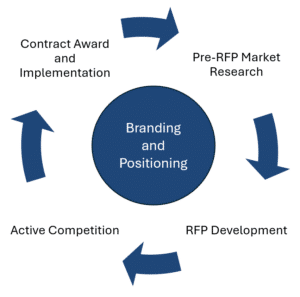You’re interested in selling to the federal government? Perhaps you’ve won a contract or two or have been told that the government buys what you sell? Why not give it a shot? The good news is that the U.S. federal government is a fantastic customer – it has a huge budget and pays its bills. However, it is important to understand that sustained success in the federal space requires understanding the ins and outs of this complex market and dedicating the needed resources to commit to the market. Jefferson can help you understand the how, when, and who of federal contracting.
Getting Started
You can’t be successful selling to a market you don’t understand. Assessing the market, analyzing your competitors, and understanding the federal-specific security and compliance requirements are necessary to effectively pursue the market. You will need to identify which federal agencies are most likely to need your products or services. Researching who your competitors are, what contracts they’ve won, and their strategies will allow you to better understand the market landscape. If you find a sufficient addressable market, it’s time to get started!
How? – Strategies for Success
Commit to the market! Success in federal market requires top-down buy-in of the government as a customer. Budget should be dedicated for business development, federal marketing, and proposals with an understanding that the federal sales cycle is often much longer than the commercial sales cycle. Specific elements of creating success in the federal market include:
- Strategy – Based on your market research, develop a business development/ marketing strategy that is consistent with your internal bandwidth. Do not attempt to respond to everything. Take the time to understand your target customer. The government is looking for a partner that knows their pain points and culture.
- Marketing – Your marketing strategy should be part of an overall business development strategy. Every marketing activity should be tied to advancing a business objective.
- Processes – Federal contracting is a complex web of policies, regulations, and requirements. Familiarize yourself with the FAR (Federal Acquisition Regulations), which governs all federal procurement processes, and understand all the compliance requirements specific to your industry and any regulations pertinent to your products or services.
- Flexibility – Be flexible and strategic when addressing federal acquisition barriers. Team with small businesses for set-aside contracts or integrators for large programs. Demonstrate success incrementally, prove yourself as a problem solver and solutions provider, and become a trusted partner to shape how the Agency procures the service or product.

When? – Understanding the Lifecycle
The federal sales cycle is typically longer than the commercial cycle and has strict timelines around when industry can and cannot engage with the government.
Pre-Request for Proposal (RFP) Market Research: The government conducts market research to understand if products/services are available to meet its need. This is the appropriate time to meet, brand, and position with the government.
RFP Development: The government is defining its scope of work. While discussions with the government are allowed by law, communication with the Program Office may be limited or not permitted.
Active Competition: Once the government releases the RFP, no communication is permitted with the Program Office until contract award.
Contract Award and Implementation: Open communication is permitted.

Who? – Decision-makers, Stakeholders, Influencers
In federal contracting, the decision-makers, stakeholders, and influencers span a wide range of roles within government agencies, the private sector, and other relevant entities.
Decision-Makers
- Contracting Officers (COs): They are authorized to enter into, administer, and terminate contracts on behalf of the federal government. They ensure that all contract actions comply with federal laws, regulations, and policies.
- Contracting Officer’s Representatives (CORs): Designated by (COs) to perform certain contract administration duties. As the CO’s representative, they ensure proper implementation of requirements, monitor the technical efforts being performed under the contract, and are responsible for the day-to-day administration of a contract.
- Program Managers (PMs): Responsible for the overall planning, execution, and performance of specific programs. They define the requirements and work closely with contracting officers to procure necessary goods and services.
- Senior Executives and Agency Heads: High-ranking officials within federal agencies who provide strategic direction and approve major procurement decisions.
Stakeholders
- End Users: Individuals or groups within federal agencies who will directly use the procured goods or services. Their needs and feedback are critical in defining requirements and evaluating contractor performance.
- Agency Procurement Offices: Responsible for managing the acquisition process within their respective agencies. They ensure compliance with federal acquisition regulations and policies.
- Financial Officers: Ensure that funds are available and properly allocated for procurements. They play a role in budget planning and approval.
- Legal Advisors: Provide legal guidance to ensure contracts are compliant with laws and regulations. They assist in resolving disputes and interpreting contract provisions.
- Office of Small and Disadvantaged Business Utilization (OSDBU): Advocates for small businesses and ensures they have opportunities to participate in federal contracting.
Influencers
- Industry Associations and Advocacy Groups: Organizations like the National Defense Industrial Association (NDIA) and Professional Services Council (PSC) represent the interests of contractors and influence procurement policies and practices.
- Lobbyists: Representing various industries and companies, lobbyists work to influence legislation and policy decisions affecting federal contracting.
- Congress: Through legislation and oversight, Congress influences federal contracting by setting budgets, passing procurement laws, and conducting hearings on contracting practices.
- Office of Management and Budget (OMB): Provides oversight and guidance on federal procurement policies, ensuring they align with broader administration goals.
- General Services Administration (GSA): Influences contracting by providing centralized procurement for federal agencies and setting policies and standards.
- Auditing and Oversight Bodies: Entities such as the Government Accountability Office (GAO) and agency Inspectors General (IG) review and report on federal contracting activities, influencing practices through their findings and recommendations.
- Media and Public Opinion: Coverage of federal contracting practices and controversies can shape public perception and influence policymakers.
Foundational market research and an understanding the how, who, and when of the federal market are key to getting started in the federal market. Jefferson can help develop and execute your strategy! View our capabilities.
About the author:
MJ Sivulich is a Senior Vice President and leads Jefferson’s business solutions practice. MJ provides federal business development, capture, proposal, government affairs, and marketing support to industry clients. To contact the author or learn more about Jefferson’s federal business development services, please email contact@jeffersonsg.com.
